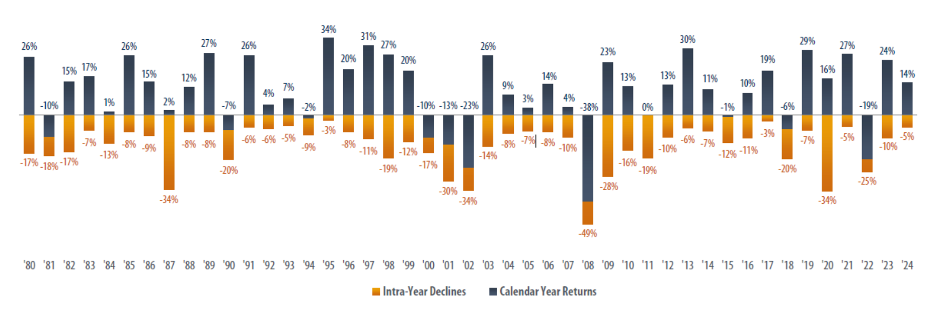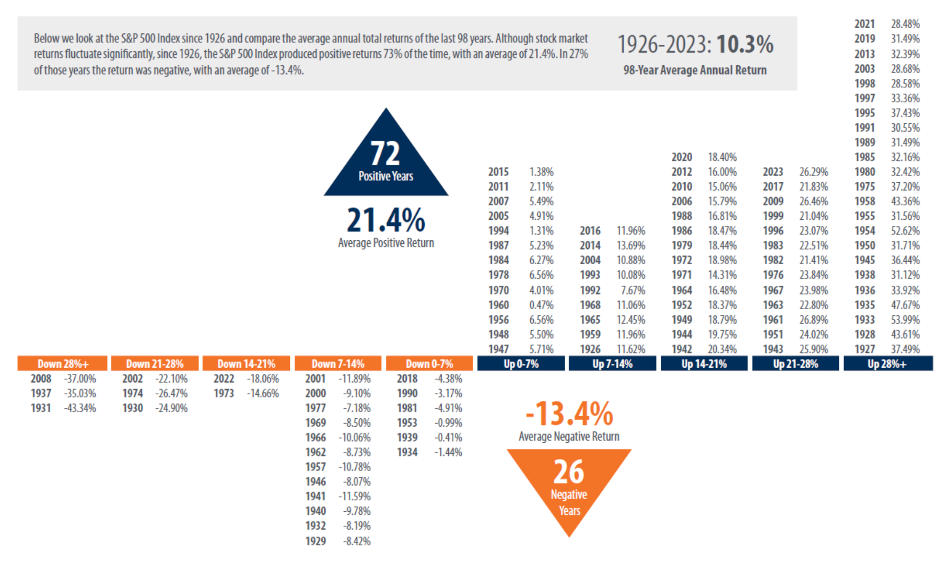Table Of Contents
I. Preparation is Key
II. Market Corrections: A Normal Part of Investing
III. Risk Management and Rational Decision-Making
IV. Strategic Investments During Market Downturns
V. Optimism as a Foundation
VI. The Value of Financial Advisors
"Be fearful when others are greedy and greedy when others are fearful." This timeless advice from Warren Buffett is often quoted in the world of finance, yet it's one of the hardest principles for clients to embrace. When the market drops by 5%, 10%, or even 20%, the natural instinct for many investors is to reduce risk, not increase it. This reaction, while understandable, can be detrimental to long-term financial success.
I. Preparation is Key
The best strategy to navigate market downturns is to prepare for them in advance. During bull markets, I make it a priority to discuss potential downturns with my clients, outlining what we will do when markets inevitably decline. This proactive approach helps clients feel more secure and less inclined to panic when faced with a downturn. When they express a desire to go to cash during a market dip, I remind them of our earlier conversations and the plans we set in place.
II. Market Corrections: A Normal Part of Investing
Market corrections and dips are normal and frequent occurrences. In fact, intra-year declines of up to 15% have happened in two-thirds of the years since 1945. Despite these dips, stocks generally rebound within the same year. Understanding this historical context can help investors remain calm and avoid panic selling.
Interestingly, when the Volatility Index (VIX) closes above 30—a top decile measure—the market tends to perform above average over the next six months, with positive returns in 81% of those periods. This data suggests that buying during periods of high volatility can be a successful strategy.

III. Risk Management and Rational Decision-Making
The key to capitalizing on market declines is ensuring that your risk exposure is manageable. If your portfolio's losses exceed your comfort level, you are less likely to make rational decisions and more likely to avoid adding exposure during downturns. By maintaining an appropriate level of investment risk, you position yourself to take advantage of buying opportunities when stocks are discounted.
IV. Strategic Investments During Market Downturns
In 2022, one of the most challenging years in recent history, we made strategic investments that yielded impressive returns. Our key purchases included NVDA (down 50.31% in 2022, up 588.4% since 2023) AMZN (down 49.62% in 2022, up 91.71% since 2023), META (down 64.22% in 2022, up 295.30% since 2023), MSFT (down 28.69% In 2022, up 64.81% since 2023), DKNG (down 58.54% In 2022, up 179.20% since 2023), PANW (down 24.81% In 2022, up 110.80% since 2023) and several others. We believed the market was overreacting and undervaluing these great companies, providing an opportunity to buy at reduced prices.
V. Optimism as a Foundation
Our analysis always begins with a bias towards optimism, as 75% of calendar years are positive for the stock market. Using this optimistic base, we adjust our market projections based on specific events and conditions. While the market averages a 10% return, individual year outcomes often vary significantly from this average.

VI. The Value of Financial Advisors
Financial advisors bring substantial value to their clients, with some institutions estimating an average annual added value of around 3.5%. The majority of this value comes from behavioral finance impacts. Advisors help clients navigate market turbulence, encouraging them to add to solid positions while prices are low or, at the very least, preventing panic selling. Additionally, advisors provide value through tax-saving strategies such as tax-loss harvesting, which can be crucial during market downturns.
Finally, clients should be educated about the benefits of dollar-cost averaging, especially if they are several years away from retirement or major capital expenditures. Consistent investing over time can smooth out market volatility and lead to better long-term outcomes.
By preparing in advance, maintaining a balanced risk exposure, and leveraging the expertise of a financial advisor, investors can turn market downturns into opportunities for growth and financial success.




